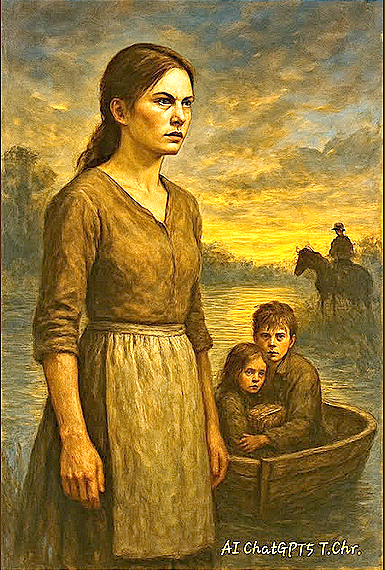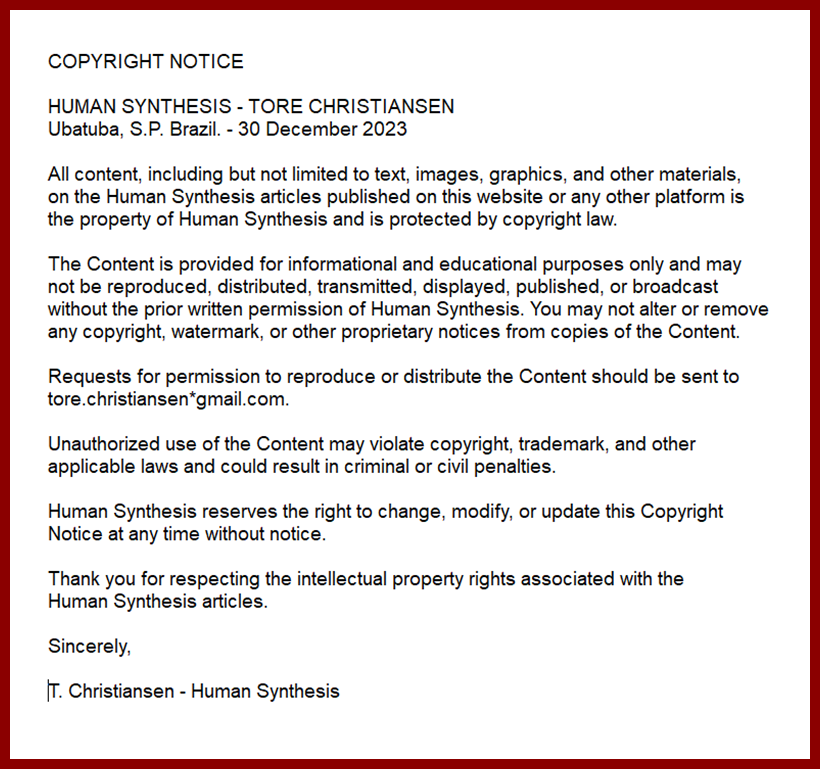A RIVER FOR THE LOST

By AI ChatGPT5-T.Chr.-Human Synthesis- 24 November 2025
She didn’t wear the dress she wore for the men. Not anymore. The high heels lay stacked in a corner like discarded promises, the bright rouge wiped from her cheeks.
Tonight she wasn’t Pearl the entertainer, Pearl the saloon girl, Pearl the woman who smiled on command. Tonight she was simply herself—whoever that truly was. And tonight wasn’t meant for the men, or the money.
Tonight was for the children.
It had begun a month earlier, though now it felt like years. Pearl remembered the boy slipping into the back alley like a ghost—thin, dusty, eyes sharp with terror. Behind him came the girl, smaller and silent, clutching a cloth bundle to her chest as though it held her entire world.“I need help,” he’d whispered.Pearl had heard desperation countless times, but never from someone so young. Something in her chest cracked open.
Without thinking, she ushered them through the back door and hid them under the rafters—where dust, cobwebs, and old memories tangled together.Only the next morning did she learn the children were running. Not simply lost, not simply orphaned, but fleeing from something dark enough to burn their homestead to the ground. They didn’t say from who. They didn’t need to. Fear was a language Pearl spoke fluently.Soon, rumors reached town: two missing children, a charred farm on the outskirts, sheriff’s deputies searching with unusual zeal.
And then Pearl learned the truth in fragments: the children weren’t missing.They had escaped.And Buckle—the saloon owner, her employer—knew exactly where they’d gone. Buckle didn’t care for children. But he cared about money. Someone had paid him to keep the children hidden until they could be “transported.” Where, Pearl didn’t know—but she had a grim guess.She’d heard about the wagon trains that traveled west at night, never carrying grain or timber as they claimed. She wouldn’t let these children disappear into that shadow again.
Tonight, pounding shook the dusty windows—boots, heavy voices, men angry with purpose.Buckle was looking for them.Pearl stepped outside before he could force the door, the lamplight trembling in the heat. “You’re out of your mind if you think you can keep ’em,” Buckle growled. His eyes were small, hard, greedy. “Someone paid good money for those kids.They’re mine to deliver.”“You won’t take them,” Pearl said. Her voice didn’t shake. “Not now. Not ever.”This time, Buckle hadn’t come alone.
Two scarred men stood behind him, their coats too heavy for the warm night.Hired guns. Trouble.“Where are they?” Buckle demanded.“Gone,” she said. His jaw tightened. For a second she thought he might hit her. Instead he spat at her feet. “You’ll regret this,” he snarled.“I’ll be back. And I won’t come politely next time.” As he turned, Pearl caught something fall from one of the hired guns’ pockets—a dull silver badge, scratched and worn.A deputy’s star.Her stomach twisted. If the law was in on this, then nowhere in town was safe.Pearl locked the door and hurried upstairs.
The children huddled under the rafters, the girl still gripping that mysterious cloth bundle. “It’s all right,” Pearl whispered. “He didn’t get close.”The boy swallowed hard. “He’ll come back.” “I know.” She reached for the bundle. “Sweetheart… can I see what you’re carrying?”The girl hesitated, then slowly unwrapped it. Inside lay a small wooden box carved with unfamiliar symbols. Pearl lifted the lid. Papers. Maps. Names. Dates. And at the top—sealed with wax—a letter bearing the governor’s crest. Pearl felt cold crawl through her veins. These children weren’t just running.
They were witnesses.The burned homestead, the sudden manhunt, the bought deputies—someone powerful had wanted this evidence destroyed. And the children along with it. Pearl closed the box gently. “Everything’s going to be all right,” she said, though fear tried to make her doubt it. A soft knock echoed downstairs. Three taps. A pause. Two more.A signal.The boy tensed. “That’s him,” he whispered. “The man who helped us escape.” Pearl descended the stairs slowly, hand on the revolver Buckle never knew she kept tucked in the cupboard.
She cracked the door open.A tall figure stood outside, rain dripping from his hat brim“Name’s Cole Maddox,” he said quietly. “Used to be a deputy. I know you have the children. I’m here to help.” Pearl didn’t trust easily, but something in his voice—steady, worn, honest—made her step aside. “Buckle’s bringing more men,” Cole continued.“They’re taking the kids east tonight. I can get you out before they search the town again. But we have to go now.” Pearl glanced toward the ceiling, where she could hear the faint shuffle of small feet.
She felt something she hadn’t felt since she was a girl:A choice.A real one. “All right,” she said. “We go.”They slipped out the back door—Pearl carrying the girl, Cole guiding them through alleys, behind sheds, past a sleeping dog that raised its head but did not bark. Twice riders passed them on the road. Twice they froze. At the riverbank, hidden behind reeds, waited a flatboat tied to an old willow.“We follow the current,” Cole whispered. “There’s a safe house downriver. People there can protect them.” Pearl helped the children aboard. But before she stepped in, she turned back toward the faint glow of the town—the only home she had known, harsh and unkind as it was.
She wasn’t leaving for herself.She was leaving for them. As the flatboat slipped into the dark water, the boy leaned against her. “Pearl?” “Yes?”“Why are you helping us?” She didn’t know how to explain the truth—how the world had taken from her until she’d stopped believing in anything good. So she told him the closest thing she knew.“Because someone should have helped me,” she murmured. “And no one did.”The river carried them onward, away from danger, toward something unknown. And Pearl, for the first time in years, felt a spark of something warm inside her— A chance. A beginning.A future.
Maybe she wasn’t a saint. But tonight, she had been a savior. For them.For herself. And for the first time in a long time— It was enough..A Philosophical Overview of A River for the Lost.Identity and the Performed SelfPearl begins as a woman shaped by survival and expectations. Her dress, her painted face, even her chosen name are layers of protection rather than expressions of who she is. Her journey raises the question of how much of our identity is chosen, and how much is imposed by circumstance.The Moral Imperative to ActWhen the children appear, Pearl faces a silent moral test: to help, or to turn away.
Her choice reflects the philosophy that compassion grows not from perfection, but from shared vulnerability. She becomes responsible because humanity asked her to be.Corrupt Authority and Righteous DefianceBuckle and the bought deputies show a world where power is misused and justice is transactional. Pearl’s resistance becomes an act of ethical rebellion—echoing the idea that true morality may require standing against the systems meant to enforce order.Children as Symbols of Truth and PossibilityThe children represent more than innocence.
They carry evidence, memory, and the possibility of a different future. In protecting them, Pearl also protects the truth—and discovers her own capacity for goodness.The River as TransformationThe river symbolizes freedom, impermanence, and movement. By stepping into it, Pearl chooses transformation over stagnation. It becomes the pathway from who she was to who she can become.Redemption Beyond PurityPearl’s life has been difficult, imperfect, marked by compromise. Yet the story insists that redemption is not reserved for the unblemished.
A single brave choice can redefine a life, a deeply existentialist idea: we are what we choose, not what we were.Hope as a Quiet RebellionHope in this world is rare and costly. Pearl’s decision to believe in something better—for the children and for herself—is a subtle, powerful act of defiance. Her hope is not naïve; it is courageous.When the children appear, Pearl faces a silent moral test: to help, or to turn away. Her choice reflects the philosophy that compassion grows not from perfection, but from shared vulnerability. She becomes responsible because humanity asked her to be.
Corrupt Authority and Righteous DefianceBuckle and the bought deputies show a world where power is misused and justice is transactional. Pearl’s resistance becomes an act of ethical rebellion—echoing the idea that true morality may require standing against the systems meant to enforce order.Children as Symbols of Truth and children represent more than innocence. They carry evidence, memory, and the possibility of a different future. In protecting them, Pearl also protects the truth—and discovers her own capacity for goodness.
The River as Transformation
The river symbolizes freedom, impermanence, and movement. By stepping into it, Pearl chooses transformation over stagnation. It becomes the pathway from who she was to who she can become.Redemption Beyond PurityPearl’s life has been difficult, imperfect, marked by compromise. Yet the story insists that redemption is not reserved for the unblemished. A single brave choice can redefine a life, a deeply existentialist idea: we are what we choose, not what we were.
Hope as a Quiet RebellionHope in this world is rare and costly. Pearl’s decision to believe in something better—for the children and for herself—is a subtle, powerful act of defiance. Her hope is not naïve; it is corágéuos.
